published: 20 /
3 /
2011
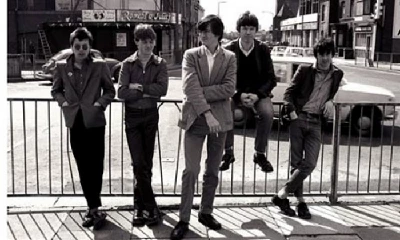
Denzil Watson speaks to bassist Michael Bradley from Northern Ireland punk pioneers and Peel favourites, the Undertones, about his band's long history and their just released double CD compilation album, 'True Confessions'
Article
Bursting out of the late 1970’s Northern Irish punk scene they can lay claim to writing John Peel’s favourite track of all time (‘Teenage Kicks’), they can boast seven UK Top 40 singles (when the charts actually mattered) and produced arguably one of the best song-writing teams of the punk era (the be-spectacled guitarist brothers John and Damian O’Neill). They are of course Derry’s the Undertones.
Feargal Sharkey may have swapped singing about chocolate and girls for the corridors of power in Polydor’s A&R department and later as head of UK Music, but a rejuvenated the Undertones have been regularly treading the boards with new front man Paul McLoone. They are about to embark on an UK tour playing their classic 1979 debut album ‘The Undertones’ in its entirety and will also at the same time be releasing a double CD compilation album, 'True Confessions'.
Pennyblackmusic caught up with their affable bassist Michael Bradley who now combines his Undertones duties with DJing on his own show for BBC Radio Ulster to talk about his love of sandwiches, why Feargal no longer shares the stage and why they will forever be indebted to John Peel.
PB: Does it seem a long time since you were playing the schools, parish halls and scout huts of Derry back in the mid-70s?
MB: It actually doesn’t seem a long time. We were just about learning how to play our instruments and how to complete a song. And when you’re on stage playing the same things go through your mind now as they did back then. Along the lines of “Is this any good?” and “Do people like what we’re playing?” The same old insecurities are there.
PB: Did you ever think it would turn into a career that would span over 35 years?
MB: No is the short answer to that. It was a bit of a surprise to us to be honest. The first surprise was to actually be able to make a record. It wasn’t that easy for bands to make records back then. And for us to become successful in any shape or form was a surprise as well.
PB: Did you feel you had anything in common you peers back in 1976 when punk arrived?
MB: When we first heard the first Eddie and the Hot Rods record or the first Ramones album we completely identified with it musically. Obviously we didn’t identify with it stylistically, but we immediately got the whole thing in terms of short fast songs with a bit of humour in it. Maybe it was because we were 15 but we just thought, “This is our music”.
Twenty years earlier we may have been Teddy Boys. But we were the right age for punk and we had the right ability, or rather lack of ability for it so we identified with it. I think most people in punk can see through the bondage trousers. Back then you immediately knew who the poseurs were and who had just latched onto the latest fad. But at the same time you knew who the really genuine practitioners of punk were. Like if you look at the Buzzcocks. The Buzzcocks looked no more like the stereotype of punk rock band than we did.
PB: Talking of your peers, do you have any memories of supporting the Clash in the US in the late 1970s?
MB: That was our first ever visit to America so it was absolutely brilliant. It was 1979 and most of America still didn’t know punk. It was still very much the land of Fleetwood Mac and Boston. The Clash were great and we seemed to go down pretty well. They also had great support acts. We were generally on first then on after us was Bo Diddley and sometimes the David Johansen Band [of New York Dolls fame], so those days were fantastic experiences. Outside of the Clash shows we did some shows of our own and flares were still very much the big fashion item.
PB: Your really big break came the year before in 1978 ,didn’t it? Can the importance of the patronage of John Peel back then ever be overstated in terms of the band's elevation to the big time?
MB: No, it can’t. We were the only band you could say that about. He did have other favourite bands. He loved the Fall and Marc Bolan, but we were the only one he was entirely responsible for making successful. ‘Teenage Kicks ‘was our demo and we sent it out to Stiff Records, Chiswick Records and Radar Records and we got rejected by them all.
Then we made the record with Good Vibrations, a small record label in Belfast and Terri Hooley who owned the label took the record to Rough Trade in London and CBS and so on, and they all weren’t interested and it was only because John Peel played it that Sire Records picked up on it. So, yes, I do think the success of the Undertones was down to John Peel. ‘Teenage Kicks’ took on a life of its own. He talked about it right up until the grave.
PB: The royalties you get must be pretty healthy given the number of times it’s been covered?
MB: The best cover I heard of it was by Union Avenue and they did it in the style of Johnny Cash, with ‘Ring of Fire’ trumpets. It’s a great version of it.
PB: I think the worst version I’ve heard must be Busted's “attempt”.
MB: The worst version I heard, and I can’t remember the name of the band, was a rave version and it was utter shite. I haven’t heard Jedward’s version or Busted’s attempted. But I don’t mind anyone doing it. I think it’s fantastic.
PBM: Throughout the month of April you're taking your debut album ‘The Undertones’ out on the road in its entirety. What are your memories of recording the album?
MB: We recorded it in Eden Studios down in London and it was in the month of January in 1979. What I remember was that it was our first ever experience of being in a studio. It was only four weeks. One thing that struck me, and this is going to sound really mundane, was that if you wanted sandwiches someone would go out and get them for you. That was one of the things I remember.
Up until then we’d only done one tour in the UK as a support band, a week of dates with the Rezillos and then they went and broke up. So we had no experience of being the main band at anything. So we were in there. and there were pianos and you could hire in guitars. You could hire a keyboard. I think we hired a Vox Continental and we used that on some songs like ‘Here Comes the Summer’.
So there was always that focus on the band. And all you had to do was play and made the record. I wasn’t sure whether we liked it or not at the time. Admittedly it is my favourite Undertones record, but then it sounded very different to ‘Teenage Kicks’. Plus a month before we had recorded the second single ‘Get Over You’with the same producer in the same studio and I didn’t like the production on that at all. I thought it was very smooth and not very good at all.
PB: If you listen back to the album now, and perhaps it’s due in part to the focus of the songs, youthful relationships and adolescence for example, it doesn’t sound dated, does it?
MB: No, that’s right. It’s quite a simple record, no pretensions. We did a show in Belgium when we tried playing the album in its entirety and it sounded really good.
PB: Are you playing the tracks in the order that they are on the original LP?
MB: Yes, we are.
PB: And how about the B-sides from the LP’s singles?
MB: No, we aren’t playing those.
PB: Okay, let’s move on to your second album ‘Hypnotised’that made 1980 your most successful year to date.
MB: We had two bona-fide hit singles. There is a theory that ‘My Perfect Cousin’ was a hit because there was a strike at ‘Top of the Pops ‘that spring, so people didn’t realise how ugly we were and we didn’t put people off! No, we had a great year. The record we were really proud of. I remember when the LP chart positions came out we were at the O’Neill’s house in Derry.
Feargal came in after being on the phone and he said “Number 6!” and it was just a huge deal for us. We were just in Derry and we weren’t even doing anything. These days a band would be doing every hamster promotional wheel out there. We were in Derry just going “Ah, the record’s out today, great!”
PB: There isn’t that excitement about the charts anymore, is there?
MB: No, it’s a completely different situation. There’s no communal spirit of sitting round watching ‘Top of The Pops’ and I don’t hear my children talking about what’s Number One or anything. People just don’t care about the charts at all.
PB: For your 1981 third album, ‘The Positive Touch’, you appeared to have become more politically focused?
MB: Yes and no. I think it depends on who you talk to in terms of who wrote the songs. John certainly did, but in very subtle ways. Nothing explicit. Damian thought he was going to write a song called ‘It’s Going to Happen’ about the Hunger Strikes, but when it came to the verses that was left to me ,and I shied away from that as I didn’t think I couldn’t have done that properly. It was very political times here in Northern Ireland in 1981, and that record came out during the time of the Hunger Strikes when there was some serious violence going on back home. We missed most of it as we were touring.
The main thing about ‘The Positive Touch’ was that we had a complete free reign because we didn’t have a recording contract at the time. We had left Sire but we hadn’t signed a new deal , although we had the money to record the LP ourselves so we took our time and experimented with it quite a lot. It’s bitty. Some bits are good in my opinion and other bits aren’t so good.
PB: It got quite a lot of critical acclaim but performed less favourably from a commercial perspective, didn’t it?
MB: That’s right. I think at that stage the charts, or the record buying public, had gotten fed up of the punk thing. I remember we did ‘Top of the Pops’ with Duran Duran and we saw the writing on the wall. We saw all these guys in suits and fancy hair-dos and thought they’re not going to look for bands like us anymore. It was also very different from ‘My Perfect Cousin’. Perhaps the smart thing to have done was to have rewritten the likes of that and ‘Jimmy Jimmy’, but but we weren’t interested in that at all.
PB: By the time you came to write your fourth album ‘The Sin of Pride’ in 1983 things had become a little fractious between Feargal and John O'Neill, hadn’t they?
MB: Oh, yeah. It was interesting. I had some really bad memories of the studio. John was the songwriter so he’d have been there when Feargal was doing his thing so you could just detect the tension.
PB: What exactly happened?
MB: It was a bit of a personality thing. Maybe Feargal was a bit pissed-off that he wasn’t writing any of the words and he was being directed how to sing. That was probably a mistake. It didn’t happen all the time, but when it did happen and things weren’t going well as it was coming after a failed LP there was tension.
EMI thought ‘The Positive Touch’ was going to do well and when it didn’t and we got round to doing ‘Sin of Pride’ EMI thought, “We’ve paid these guys money” ,so they had some input into the LP. They had a listen and didn’t like it. We went back into the studio and made some new songs and presented them to them and we just knew that this was going to be over in six months and it was.
PB: Okay, so let’s fast forward to 1999. What lead you to reforming 15 years after the initial split?
MB: It was a mixture if things really. A few years before that me and the drummer, Billy Doherty, had very occasionally played with the Saw Doctors. Whenever they did ‘Teenage Kicks”’as an encore they’d invite us down to join them and we weren’t playing in a band so we’d go along. We did that a few times in 1992 in Dublin and a couple years later in Glasgow and again in 1996 in Belfast. They were doing the Galloway Arts Festival in 1999 and they asked if we’d do it again and I thought, yeah, I don’t mind, so I asked Billy and he asked John. And John said yes and given that Damian wasn’t playing as That Petrol Emotion, his next band, had broken up, he said he’d do it too.
And it was great. The four of us went down to the festival and the singer of the Saw Doctors decided to sing as none of us wanted to sing. So we did that and we thought “Why we don’t do this again?”. Then we were asked to reform for the re-opening of a venue-cum-arts centre in Derry called the Nerve Centre and we said yes but we didn’t have a singer and no one wanted to ask Feargal.
PB: How come?
MB: He’d been asked in 1994 as there were some offers for us to do some festivals and we were all up for it and Feargal said no so we didn’t ask him. We thought he’d probably say no and John kind of said he’d prefer not to ask him. So we didn’t ask him, but then he didn’t ring up asking why we didn’t ask him. So we knew this was going to be really difficult because we needed to get a different singer and it was going to sound different. We knew this guy called Paul McLoone who was a friend so we thought, “Why don’t we ask Paul?”. So we asked him and he was great.
PB: Have you had any contact with Feargal over the last five or six years?
MB: Not really. I met him once at an event in London. I don’t know what his attitude is to it. I think he might be a bit pissed-off about us doing it without him. But then he’s always the first to say that it doesn’t seem right for someone who’s nearly fifty years old to be on stage singing ‘Teenage Kicks’. I don’t care. It’s only a song. It’s not a manifesto, just a record. And when you play it people enjoy it. So I don’t know what his attitude is. It doesn’t really bother me.
PB: Given that not too many bands have reformed successfully without their former singer, this must have been quite daunting for Paul, right?
MB: Well, there was strange dynamic in the Undertones as the singer had no input into the song-writing. I think that’s very unusual in a lot of bands. It was all John, or all Damian or all me that wrote the songs. I always say that it was a very bad idea, but it really worked. In terms of it being a commercial venture it’s a real drawback, but it suits us down to the ground. We couldn’t have done it with Feargal. We know we have a kind of low profile and people can believe we’d do it without him, but it was up to the four of us and it just felt right at the time.
PB: Having seen you live on two occasions I have to say I think that it does work.
MB: Well, that’s good to hear and we think it works. But then again I’m very prepared to come across people who don’t think it works. I know a lot of magazines don’t like it and think it doesn’t work.
PB: And then four years later you took the step that many bands that reform don’t take and you recorded new material in the shape of the 2003 album, ‘Get What You Need’.
MB: [Reformed] Bands recording again is often frowned upon but it was just one of those things that we had to do. John still writes songs so we just thought, “Are we going to do this? Yes. Let’s do it”, with no expectations of it selling or it being reviewed. We thought, “Let’s just stick it out and see if people like it” so we did. And four years later we did the same thing again with our next album, ‘Dig Yourself Deep’.
If you’re in a band, even if you’re not full time, writing new songs and recording new songs is part of being in a band. As long as you don’t expect to make a career out of it, it’s a worthwhile thing to do. We still play a lot of the songs from the first two albums. We don’t play anything of ‘The Sin of Pride’ because it just doesn’t work on stage as well. We do some of the new songs as well. We have the luxury that we’re not dependant on it in terms of it providing money. It ticks over and pays for itself and it’s like a hobby so we can afford to do the un-commercial things. We can go, “Yes, let’s make another record. Let’s reform without without Feargal. Let’s do what we basically want to do”.
PB: But you still manage to pull in a good crowd in decent sized venues, like for instance The Garage in London on your forthcoming tour.
MB: I still prefer to play the smaller venues anyhow. A few people turn up. You can still have a good atmosphere. That shows how pessimistic I am you know. Whenever I go on tour and I see a big hall I go, “Oh my God, this is going to look empty” because I don’t expect big crowds. But normally I’m surprised. I love going into a small venue. We’re playing King Tut’s in Glasgow and I love that venue.
PB: What are plans post the April tour and the release of the ‘True Confessions’ compilation album?
MB: Well, we are working on new songs. We’re doing a couple of shows in America in May so we’re looking forward to that too. What it is, we just have to knuckle down and record some more songs. But day jobs and life tends to interfere with the best laid plans, so we’ll see how it goes.
PB: Do you still get that same buzz before you go on stage as you did back in the 70s as a teenager?
MB: Well, I wouldn’t say buzz. I’d say more like a dread or nausea. So yes, we still feel the same. None of us take it for granted and we still all get intense. I do anyway. And I know Paul does and I think Billy does too. At the same time there are the same couple of minutes before you go on stage when the funniest of jokes just occur to us.
PB: Okay, so the kicks may not be of the teenage variety any more but please keep on doing it! Thank you very much for speaking to us Michael and all the best with the tour.
MB: Thank you very much.
Band Links:-
https://www.theundertones.com/
https://www.facebook.com/OfficialTheUn
https://twitter.com/TheUndertones_
Picture Gallery:-
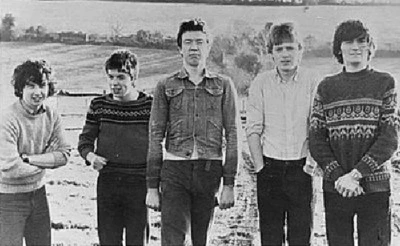
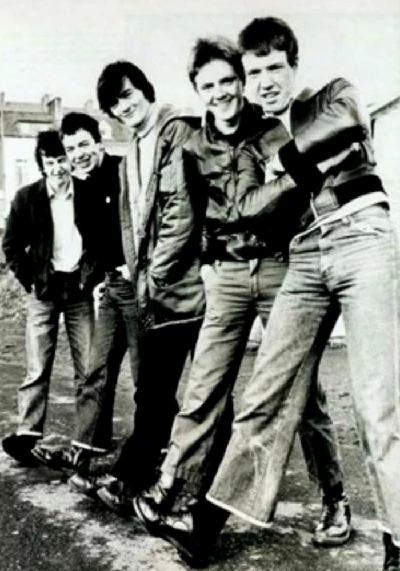
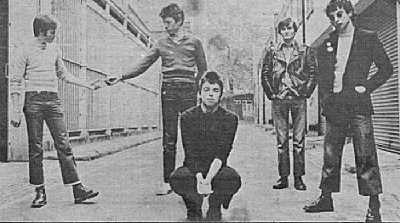
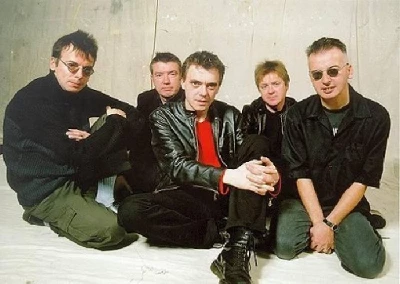
Visitor Comments:-
|
|
865 Posted By: martin , chapel hill NC USA on 02 Jun 2018 |
This might explain it:
https://www.youtube.com/watch?v=f7N-09XL5rw&t=4s
|
|
846 Posted By: Jim, Manchester UK on 20 Oct 2017 |
Hi' The photograph at the top of the page shows the band outside the Star Inn pub in Oldham' Romeo and Juliette's club across the road' I Presume they were playing in Manchester but am curious as to why they would have visited Oldham.
I dont think they ever did any gigs in Oldham
Regards
Jim
|